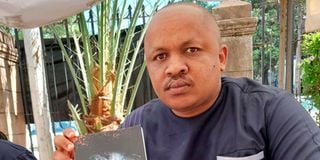Imprisoned military officer transforms into an author

What you need to know:
- Everyone at the military camp could see how affected I was. I became withdrawn.
- A colleague was so concerned and tried to talk me out of the idea but given my rebellious spirit, I didn’t listen.
- In our camp, prisoners routinely came in to do manual work as part of their duties, after which we would escort them back to prison.
Prisons can either make one a better person or transform them into a monster. Author and former military intelligence officer Daniel Musau, who uses the pseudonym of Prince Musau, says prison is a special world where survival is only for the fittest.
Would you say changing from military fatigue to prison uniform was the hardest part of your life?
It came as a total shock. By the time I was being handed the sentence, everything seemed surreal. I had made a promise never to step into, let alone spend a night in our correctional facilities after seeing firsthand the dehumanising conditions the prisoners live in.
Expound a bit…
While a military officer in Hakati military camp in Busia, my then girlfriend, also a military officer working in Nairobi, was expecting our first child. Her delivery date was fast approaching, but I couldn't get permission to proceed on leave. But, one of my colleagues was going on leave. I crossed over to Uganda and bought items for my girlfriend and the child we were expecting since things there are cheaper.
My colleague arrived in Nairobi and connected with my girlfriend. Surprisingly, the pair fell in love and slowly she began distancing herself from me. I would get calls and all manner of ridicule from colleagues in Nairobi once the two made their relationship public, and this made me look and feel like a fool. Nobody could understand why a colleague could get so close to my girlfriend yet I had bought everything for her and the baby we were expecting. I decided to teach the pair a lesson.
Did you make your threat to teach them a lesson real?
Not at all. Everyone at the military camp could see how affected I was. I became withdrawn. A colleague was so concerned and tried to talk me out of the idea but given my rebellious spirit, I didn’t listen. In our camp, prisoners routinely came in to do manual work as part of their duties, after which we would escort them back to prison.
One day, as we escorted the prisoners back, my colleague requested the officer in charge to allow us to see inmates in their cells, and the request was granted. That's when the shock hit me. I couldn't understand how so many prisoners could be crammed in such small, unhygienic, and inhumane spaces filled with huge bedbugs and fleas.
So the colleague managed to dissuade you?
I'd say he was kind of prophesying the life that would confront me later, but unknowingly. His words began making sense much later. I realised that going after my girlfriend and her new partner wouldn't solve any problem. I had been to almost every police cell in Nairobi over bar brawls and unpaid beer bills, but because of my military background, the cases would be resolved quickly and colleagues would bail me out. The look and smell of prison cells, and the threadbare uniform the inmates wore convinced me that prison wasn't the place to be.
What landed you in the slammer then?
I was in a pub one day, and in my excitement, asked everyone to order their choice of alcohol on my bill. When the bill was brought, I couldn't believe my eyes. How could I have drunk almost Sh20,000 in a single sitting? There was no way I was going to pay, and I brought so much chaos to that place. By this time, everyone was already fed up with me. Colleagues were tired of bailing me out, as I'd borrow money from them and not repay. Coming to Hakati military camp had been a demotion from Department of Defense where I had initially been posted, owing to my bad attitude toward my seniors.
After that incident, I was arrested and sentenced to four years in jail but only served two after appeal. To put it mildly, those I'd ruffled feathers with made sure I suffered in prison. Worse, my file had records of grave issues of misconduct and duty dissertation, which didn’t help my case. I didn't have a coin to my name due to my heavy drinking. My entire salary would often be depleted within three days of hitting the account.
Tell us about your first day in prison…
The reception was hellish. In prison, you don't have any rights. When I asked a warder a question, other warders jumped on me with kicks and blows, and some hit me with sticks. Had it not been for a senior warder who said I had been beaten enough, I would have died that night. Any question or mistake was met with a beating. When I revealed that I was a military officer, the warders backed off and apologised for the beatings. Once in a cell, I realised I had entered into another universe. I couldn’t choose a spot to sleep or sit up, it was chosen for me by other prisoners in an order. I slept behind the stinking toilet the first night.
So there is a hierarchy even among prisoners?
Yes. Each cell is under the control of prisoners, mainly hardcore ones who have been incarcerated for long. These are the untouchable ones. They control the flow of drugs within the prison network as well as outside prison walls. They have money. Prison warders are their slaves owing to systematic corruption within the correctional system. Cross their path and they'll pay someone to finish you off.
You mean prison authorities are that helpless?
If you know how the system works, it won't be a surprise to see prison authorities coil in horror. For example, gay weddings happen under their noses, with lavish ceremonies right inside cells, but there's no way they can deal with the issue. I tried condemning the inmates who were practising homosexuality and they hatched a plot against me.
How?
There was a time I had requested to be transferred to another prison and the request went through. In my new incarceration centre, the same sex vices were rife, and so was the use of illegal drugs. So, one day I took a Bible and opened it to Leviticus 20:13 and began preaching. My cellmates were uncomfortable, and many concluded I was a spy. The prison officers were fed with false information about me and before I knew it, I was at Kamiti Maximum Prison.
How was Kamiti like?
That's not a place for the fainthearted. Of all the military training I'd gone through, nothing had prepared me for life here. Hard labour was a daily routine. I was assigned garden duties every day, and had to stay bent tilling land for hours without stretching the stiff body. Any attempt to rise up would see warders descending on you and flogging you to within an inch of death. Drinking water wasn't allowed either, as it was believed it would reenergise convicts and encourage them to escape. By the time the shift was over, I could hardly walk. But to exert more misery, my fellow inmates and I would be allocated a heavy load to carry back to the prison store. It was torture.
After the appeal went through, how did you pick up the pieces of your life?
The stigma was real. When I was sentenced, my former colleagues flooded social media platforms with my pictures, describing me in the most despicable language. Groups that I once took loans from to sustain my drinking lifestyle were not left behind, so were individuals I owed. The damage had been done.
While still incarcerated, there is a female pastor who used to visit me and roped me into a plan to kill her husband. One policeman also wanted me to help him commit a bank fraud. Both believed that once one had been condemned by the society and the State, they had little to lose as prison becomes like their second home. I was too smart for them, and despite the promising good pay, I was content with starting life afresh. It wasn't easy, but I found my footing in writing. So far I've written three books, with my first one being about my time in Somalia, battling Al Shabaab militants.
Which are some of the mistakes you regret the most in your life?
Never listening to instructions, and talking back to superiors. Taking to the bottle is another one, although I now understand it is a disease that runs in my family. Another was taking a loan of Sh800,000 to invest in a project. I blew the entire amount on alcohol. Even with a regular salary, I could never pay rent on time and was frequently evicted. Other than alcohol, I was in several temporary relationships, changing women frequently, and this added to the mess.





